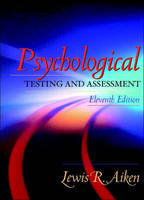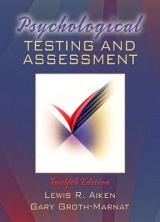
Psychological Testing and Assessment
Pearson (Verlag)
978-0-205-35471-9 (ISBN)
- Titel erscheint in neuer Auflage
- Artikel merken
A proven classic in the field, Psychological Testing and Assessment has been completely updated, offering extensive coverage of new tests, inventories, and scales, and the methods used in constructing, administering, scoring, and interpreting these psychometric instruments.
Revisions in the content and format of college entrance examinations, new editions of various tests, and renewed interest in the “politics of intelligence testing” drive Aiken's eleventh edition. Greater attention has also been given to adaptive testing, item response theory, the use of computers in psychological testing, neuropsychological and developmental testing, and applications of tests in various contexts.
This is an essential text for any student who is planning to construct, administer, and make decisions based on test scores in clinical or educational settings.
All chapters include "Summary" and "Questions and Activities."
Preface.
I. METHODOLOGY OF ASSESSMENT.
1. Historical and Professional Matters.
Historical Overview.
Testing as a Profession.
Testing Standards and Ethics.
2. Design and Construction of Tests.
Planning a Test.
Preparing Items.
Assembling and Reproducing a Test.
Oral Testing.
Performance Testing.
3. Administration and Scoring of Tests.
Administration.
Scoring.
4. Item Analysis and Standardization of Tests.
Item Analysis.
Test Standardization and Norms.
Equating Tests.
5. Reliability and Validity of Tests.
Reliability.
Validity.
Using Tests in Personnel Decision Making.
II. ASSESSMENT OF ABILITIES.
6. Standardized Achievement Tests.
Foundations of Achievement Testing.
Types and Selection of Achievement Testing.
Achievement Test Batteries.
Achievement Tests in Specific Areas.
7. Intelligence Testing.
History, Definitions, and Theories.
Individual Tests of Intelligence.
Group Tests of Intelligence.
8. Individual and Group Differences in Mental Abilities.
Mental Retardation, Giftedness, and Creativity.
Research on Demographic Correlates of Mental Abilities.
Biological Factors and Mental Abilities.
9. Developmental and Neuropsychological Assessment.
Developmental Assessment of Infants and Young Children.
Learning Disabilities.
Neuropsychological Disorders and Assessment.
10. Evaluating Special Abilities.
Concepts and Characteristics.
Sensory-Perceptual and Psychomotor Skills.
Mechanical Ability.
Clerical and Computer-Related Abilities.
Artistic and Musical Abilities.
Multiple-Aptitude Batteries.
11. Applications and Issues in Ability Testing.
Assessment in Educational Contexts.
Criticisms and Issues in Ability Testing.
Other Issues in Educational Testing.
Employment Testing and Bias.
III. ASSESSMENT OF PREFERENCES AND PERSONALITY.
12. Measuring Vocational Interests.
Foundations of Interest Measurement.
Validity of Interest Inventories.
Strong Interest Inventories.
Kuder Interest Inventories.
Interests and Personality.
Other General- and Special-Purpose Interest Inventories.
13. Measuring Attitudes, Values, and Personal Orientations.
Attitude Measurement.
Measurement of Values.
Personal Orientations.
14. Personality Assessment: Origins, Applications, and Issues.
Pseudoscience and Other Historical Antecedents.
Theories of Personality.
Uses and Misuses of Personality Assessment.
Clinical Assessment.
Other Areas of Application of Personality Assessment.
Issues and Controversies in Personality Assessment.
15. Observations and Interviews.
Observations.
Biographical Information.
Interviews.
Observations and Interviews in Behavior Analysis.
16. Rating Scales and Checklists.
Rating Scales.
Checklists.
17. Personality Inventories.
Characteristics of Personality Inventories.
Single-Construct and Symptom Inventories.
Multiscore Content-Validated Inventories.
Factor-Analyzed Inventories.
Minnesota Multiphasic Personality Inventory.
Other Criterion-Keyed Personality Inventories.
18. Projective Techniques.
Word Associations and Constructions.
Inkblot Tests.
The TAT and Variations.
Other Apperception Tests.
Prospects for Personality Assessment.
Appendix A: Measurement and Statistics.
Scales of Measurement.
Frequency Distributions.
Measures of Central Tendency.
Percentiles, Deciles, and Quartiles.
Measures of Variability.
Correlation and Simple Linear Regression.
Multiple Regression and Factor Analysis.
Appendix B: Areas under the Normal Curve.
Appendix C: American Suppliers of Psychological and Educational Assessment Materials.
Appendix D: Websites of Organizations Concerned with Psychological Testing and Assessment.
Answers to Quantitative Exercises.
References.
Author Index.
Test Index.
Subject Index.
| Erscheint lt. Verlag | 27.6.2002 |
|---|---|
| Sprache | englisch |
| Gewicht | 950 g |
| Themenwelt | Geisteswissenschaften ► Psychologie ► Test in der Psychologie |
| ISBN-10 | 0-205-35471-8 / 0205354718 |
| ISBN-13 | 978-0-205-35471-9 / 9780205354719 |
| Zustand | Neuware |
| Haben Sie eine Frage zum Produkt? |
aus dem Bereich



